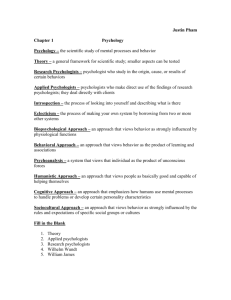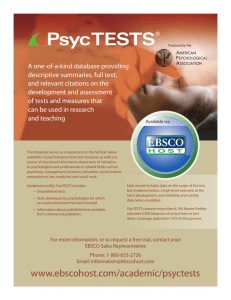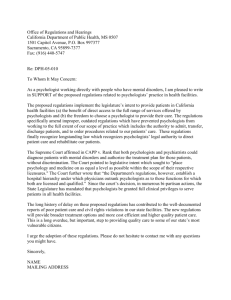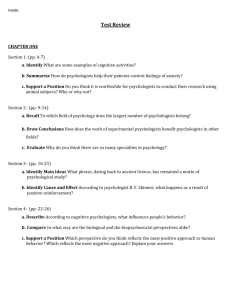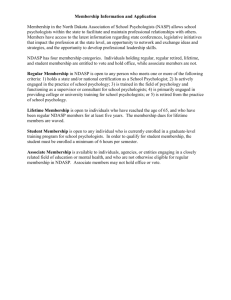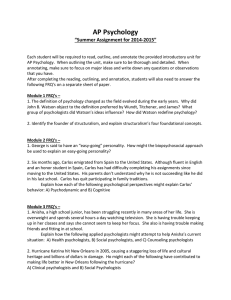Study guide one
advertisement
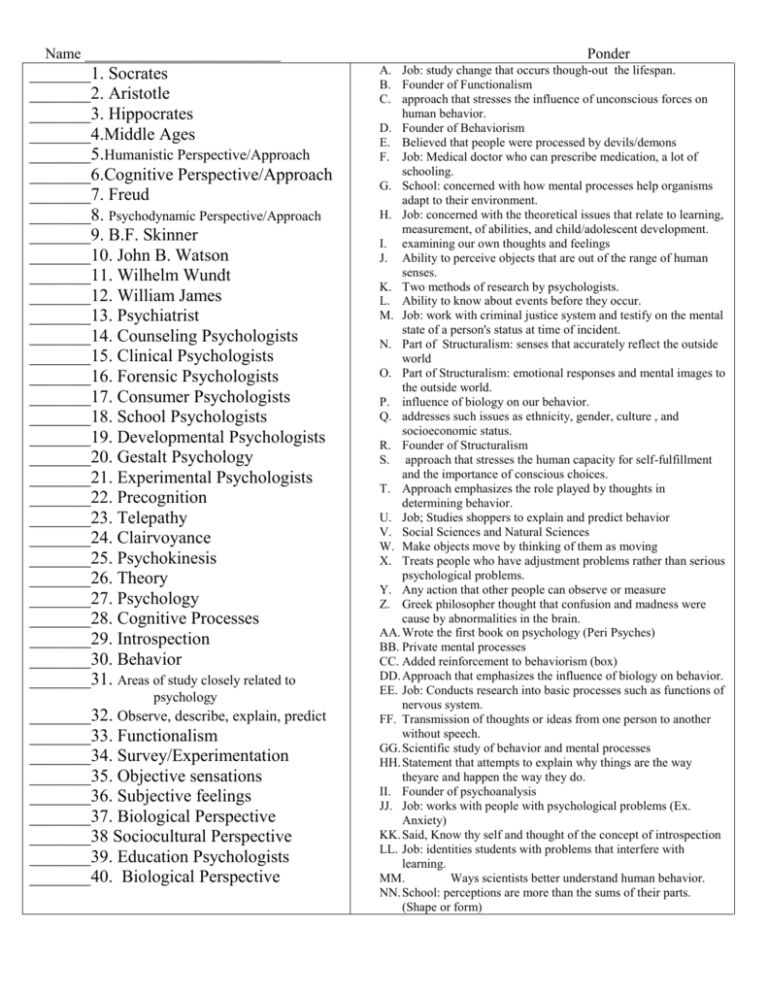
Name __________________________ _______1. Socrates _______2. Aristotle _______3. Hippocrates _______4.Middle Ages _______5.Humanistic Perspective/Approach _______6.Cognitive Perspective/Approach _______7. Freud _______8. Psychodynamic Perspective/Approach _______9. B.F. Skinner _______10. John B. Watson _______11. Wilhelm Wundt _______12. William James _______13. Psychiatrist _______14. Counseling Psychologists _______15. Clinical Psychologists _______16. Forensic Psychologists _______17. Consumer Psychologists _______18. School Psychologists _______19. Developmental Psychologists _______20. Gestalt Psychology _______21. Experimental Psychologists _______22. Precognition _______23. Telepathy _______24. Clairvoyance _______25. Psychokinesis _______26. Theory _______27. Psychology _______28. Cognitive Processes _______29. Introspection _______30. Behavior _______31. Areas of study closely related to psychology _______32. Observe, describe, explain, predict _______33. Functionalism _______34. Survey/Experimentation _______35. Objective sensations _______36. Subjective feelings _______37. Biological Perspective _______38 Sociocultural Perspective _______39. Education Psychologists _______40. Biological Perspective Ponder A. Job: study change that occurs though-out the lifespan. B. Founder of Functionalism C. approach that stresses the influence of unconscious forces on human behavior. D. Founder of Behaviorism E. Believed that people were processed by devils/demons F. Job: Medical doctor who can prescribe medication, a lot of schooling. G. School: concerned with how mental processes help organisms adapt to their environment. H. Job: concerned with the theoretical issues that relate to learning, measurement, of abilities, and child/adolescent development. I. examining our own thoughts and feelings J. Ability to perceive objects that are out of the range of human senses. K. Two methods of research by psychologists. L. Ability to know about events before they occur. M. Job: work with criminal justice system and testify on the mental state of a person's status at time of incident. N. Part of Structuralism: senses that accurately reflect the outside world O. Part of Structuralism: emotional responses and mental images to the outside world. P. influence of biology on our behavior. Q. addresses such issues as ethnicity, gender, culture , and socioeconomic status. R. Founder of Structuralism S. approach that stresses the human capacity for self-fulfillment and the importance of conscious choices. T. Approach emphasizes the role played by thoughts in determining behavior. U. Job; Studies shoppers to explain and predict behavior V. Social Sciences and Natural Sciences W. Make objects move by thinking of them as moving X. Treats people who have adjustment problems rather than serious psychological problems. Y. Any action that other people can observe or measure Z. Greek philosopher thought that confusion and madness were cause by abnormalities in the brain. AA. Wrote the first book on psychology (Peri Psyches) BB. Private mental processes CC. Added reinforcement to behaviorism (box) DD. Approach that emphasizes the influence of biology on behavior. EE. Job: Conducts research into basic processes such as functions of nervous system. FF. Transmission of thoughts or ideas from one person to another without speech. GG. Scientific study of behavior and mental processes HH. Statement that attempts to explain why things are the way theyare and happen the way they do. II. Founder of psychoanalysis JJ. Job: works with people with psychological problems (Ex. Anxiety) KK. Said, Know thy self and thought of the concept of introspection LL. Job: identities students with problems that interfere with learning. MM. Ways scientists better understand human behavior. NN. School: perceptions are more than the sums of their parts. (Shape or form)

